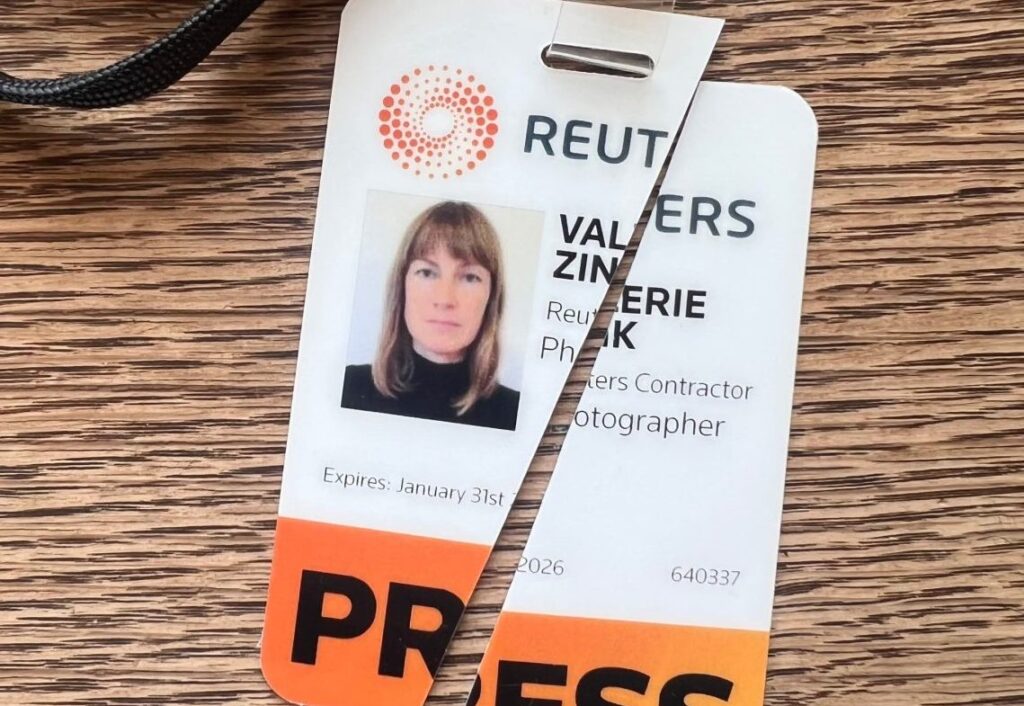
Editor’s note: Below is a statement shared on social media by Valerie Zink, a Canadian photojournalist, in which she explains that she resigned from the Reuters news agency, citing “its role in justifying and enabling the systematic assassination of 245 journalists in Gaza.” Her resignation came in the wake of the killing by Israel on Aug. 25 of five journalists in Gaza in an attack on Nasser Hospital, and a sixth journalist who was killed at Khan Younis. Those killed at the hospital included Al Jazeera photographer Mohammad Salama; Hussam al-Masri, a photojournalist for Reuters; Mariam Abu Daqqa, who worked with several media outlets, including The Independent Arabic and The Associated Press; journalist Moaz Abu Taha; and Ahmed Abu Aziz, who worked for the Quds Feed Network and other media outlets, including Middle East Eye. Hassan Douhan, a journalist and academic who worked as a correspondent for Al-Hayat al-Jadida, was killed in a separate incident in Khan Younis later Aug. 25. The People’s Tribune condemns Israel’s indiscriminate killing of journalists.
“For the past eight years I have worked as a stringer for Reuters news agency. My photos covering stories in the prairie provinces have been published by the New York Times, Al Jazeera, and other media outlets across North America, Asia, Europe, and elsewhere. At this point it’s become impossible for me to maintain a relationship with Reuters given its role in justifying and enabling the systematic assassination of 245 journalists in Gaza. I owe my colleagues in Palestine at least this much, and so much more.
When Israel murdered Anas Al-Sharif, together with the entire Al-Jazeera crew in Gaza City on August 10, Reuters chose to publish Israel’s entirely baseless claim that Al-Sharif was a Hamas operative – one of countless lies that media outlets like Reuters have dutifully repeated and dignified. Reuters’ willingness to perpetuate Israel’s propaganda has not spared their own reporters from Israel’s genocide. Five more journalists, including Reuters cameraman Hossam Al-Masri, were among 20 people killed this morning in another attack on Nasser hospital. It was what’s known as a “double tap” strike, in which Israel bombs a civilian target like a school or hospital; waits for medics, rescue teams, and journalists to arrive; and then strikes again.
Western media is directly culpable for creating the conditions in which this can happen. As Jeremy Scahill from Drop Site News put it, “every major outlet – from the New York Times to the Washington Post, from AP to Reuters – has served as a conveyor belt for Israeli propaganda, sanitizing war crimes and dehumanizing victims, abandoning their colleagues and their alleged commitment to true and ethical reporting.”
By repeating Israel’s genocidal fabrications without determining if they have any credibility – willfully abandoning the most basic responsibility of journalism – Western media outlets have made possible the killing of more journalists in two years on one tiny strip of land than in WWI, WWII, and the wars in Korea, Vietnam, Afghanistan, Yugoslavia, and Ukraine combined, to say nothing of starving an entire population, shredding its children, and burning people alive.
The fact that Anas Al-Sharif’s work won a Pulitzer Prize for Reuters did not compel them to come to his defence when Israeli occupation forces placed him on a “hit list” of journalists accused of being Hamas and Islamic Jihad militants. It did not compel them to come to his defence when he appealed to international media for protection after an Israeli military spokesperson posted a video making clear their intention to assassinate him following a report he did on the growing famine. It did not compel them to report on his death honestly when he was hunted and killed weeks later.
I have valued the work that I brought to Reuters over the past eight years, but at this point I can’t conceive of wearing this press pass with anything but deep shame and grief. I don’t know what it means to begin to honour the courage and sacrifice of journalists in Gaza – the bravest and best to ever live – but going forward I will direct whatever contributions I have to offer with that front of mind.”
Valerie Zink is a Regina-based photojournalist, documentarian and community organizer. She became active in the Palestine solidarity movement during the Second Intifada, when she worked as a medic in the West Bank and Gaza.
